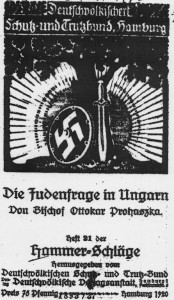This is a guest post Karl Pfeifer
Eli Wiesel visited Hungary for the first time since he was deported from his home town in 1944, under Horthy’s Hungarian administration, to Auschwitz-Birkenau. Invited by Chabad and received with all the honors of a VIP, Wiesel used the occasion of his meeting with Hungary’s president László Solyom and Prime Minister Gordon Bajnai to critizise the fact that in Hungary neonazi movements and a neonazi party is tolerated by law and by Hungarian society.
There was a gathering held in the Parliament’s Chamber of the Upper House, a chamber that is not used very often because Hungary has no upper house. The title was “Jewish-Hungarian Coexistence: Together for a Common Future.” This title was a grammatical surrender to antisemitic discourse, for the correct title should have been Jewish and Non-Jewish Coexistence in Hungary. Instead of that, it adopted the language of antisemites and of Chabad, as if a Jew could not also be a Hungarian.
Wiesel began his speech in Hungarian and continued in English. He mentioned that it was in this chamber that members of the Hungarian Upper House voted for the discriminatory Jewish Laws 1938, in 1939 [The representatives of the Churches agreed with those laws.] and an openly and brazenly racist piece of legislation in 1941, which was also accepted by the Churches, albeit with some reservation. Wiesel made it clear that in the West, Hungary at the moment has a bad reputation because of the news of the growth of anti-Semitism. He recalled the brutality of the Hungarian gendarmerie when its members gathered the Jews of his hometown of Mármarossziget, but he stressed that he has no hatred toward Hungarians. The present generation is not responsible for what their ancestors did, but they certainly must make sure that the past will not be repeated.
Gordon Bajnai’s speech emphasized the contributions that Jews have made to Hungary in the past and in the present. He admitted that the ideology that led to the Shoah is still present in certain circles and that Jews and Non-Jews have every reason to be worried. Bajnai said at the end of his speech: “It happened to us, but we committed it in large part.” As for the present, Bajnai admitted that the Hungarian governments erred when they allowed the far-right to appear in political life. In Hungary the situation is that today there are people who are fearful because of their origin, thinking, most likely, of Gypsies and Jews. Again he emphasized that the “democratic right” (equivalent of Fidesz) must draw a sharp line between itself and the extreme right. The far-right must be isolated.
But Fidesz is allied in many local administrations with the national-socialist Jobbik party and tolerated peddling of racism, anti-semitism and homophobia, despite the fact that they belong to the mainstream European People’s Party.
Chabad proudly stated:
The event was coordinated by Parliament’s Committee on Religion, Minority and Human Rights led by Mr. Zoltan Balog in partnership with Rabbi Shlomo Köves, one of Chabad’s representatives in Budapest and Executive Rabbi of EMIH Jewish community.
As a matter of fact, Balog succeeded in offending Eli Wiesel during his speech in parliament where he said: „We will not tolerate that, using the sufferings of innocent Jewish people, they [meaning those who are not ready to accept völkisch antisemitism as normalcy K.P.] force us, instead of discussing the difficult problems of our country, that we lose our time by defending ourselves against false accusations.“
Balog, who is also a Calvinist minister, told the audience that no one has to be worried in Hungary because the “state defends them” against atrocities. He promised that they would do everything in their power to stop the growth of national socialist ideology. At the same time “we will not allow ourselves or others to be branded by the stamp of anti-Semitism.”
So for Fidesz MP Zoltán Balog all those who notice antisemitism in his party and in the media bring false charges and he wants to hurt those who dare to criticise antisemitic discourse in Hungary.
In an interview given to ATV before leaving Budapest Wiesel said
What Zoltán Balog said in my presence was an insult and is inexcusable
I published an article last year about the controversy surrounding the unveiling of a bust of Ottokár Prohászka (1858-1927), bishop of Székesfehérvár between 1905 and his death and the speeches delivered on that occasion by two Fidesz MPs, Sándor Lezsák and Zoltán Balog (who has been an “advisor on matters of theology and relations with churches” to Fidesz) and also the former president of the republic, Ferenc Mádl. Lezsák talked at the unveiling about the “spiritual terror” a certain group the Hungarian people must suffer. He applauded Prohászka’s stance against “cosmopolitan parasites.” According to Balog
“there is a need for the defense of the Christian faith because if we let it be taken away from us then we Hungarians will survive only in the biological sense.”
Of course the Christian faith in Hungary is not threatened, (although a drunk radio journalist did once call for the “extermination of Christians” and was fired right away).
Balog defends Prohászka on his weblog:
“Ottokár Prohászka was a prominent catholic leader, who worked for the spiritual renewal of Christians in Hungary by evoking their social responsibility. His statements related to Jews are debated both seriously and superficially by historians and church historians. This debate is not being helped by the fact that the Budapest Holocaust Memorial Centre simply labeled him as the founder of anti-Semitism without any serious research. I’m convinced that we need to have open discussions about the heritage of our ancestors, what is it in that heritage that helps us become virtuous human beings and what is it that does not.”
Balog distorts the fact because the caption under the picture of Prohászka reads “Leading figure of conservative anti-Semitic ideology”.
Look here at the facsimile first page from his booklet The Jewish question in Hungary published 1920 in The Hague, Holland. This booklet was published also in German by an early nazi editor (see illustration) with a swastika on its title page.
Rabbi Koves of Chabad urged, at the same conference in the Hungarian parliament, the Jewish participants not to “give up your Jewish identity, your three thousand year old spiritual heritage in order to be something else.” However by collaborating with Balog and by giving him a Teudat Kashrut, the learned rabbi is not an example of being true to the Jewish spiritual heritage.
The Zionist leader Max Nordau, who was born in Budapest in 1849, wrote: “I am sorry for the blindness of Jews who comfort themselves in vain in the evils that face them now, saying that antisemitism is ephemeral and will speedily pass away. Abandon that hope!”
Most Jewish Hungarians have abandoned that hope.
On December 16th-17th in Jerusalem, the Israeli government will be holding a global conference on combating anti-Semitism. Zoltán Balog (Fidesz) will be one of the Hungarian delegates. A fellow MP, chairman of the Christian Democratic party allied with Fidesz, Zsolt Semjén.
Here a short speech he gave at a session of Hungarian parliament on September 10, 2007
“Esteemed House,
It may be somewhat unusual that in the name of the Christian Democratic Party I would like to talk to my fellow countrymen of the Jewish faith, but this is my right and my duty. I am asking my fellow countrymen of the Jewish faith and origin to consider whether it is good for the Hungarian Jewry that a party with wrong political ideas holds Uncle Schwarz and Auntie Weisz hostage. Is that good for the Hungarian Jewry?
There is social democratic antifascism as well as Christian democratic antifascism. I think it will suffice to mention that it is the Christian Democratic Party that since 1990 had two presidents who had been condemned to death by the courts during the Arrow Cross regime. It was a miracle that they managed to escape. I am taking about Sándor Keresztes and László Varga.
With this history behind my party I would like to remind my colleagues on the left of the aisle that after World War II the former Arrow Cross members—they are so often mentioned lately—did not join the Christian Democratic Party of [István] Barankovics or the Smallholders Party but the Communist Party. Then the left wasn’t so finicky.
And it wasn’t we who nationalized Jewish property but one of your many predecessors, the Hungarian Communist Party. It was the right that gave back the Jewish property. It was the Antall government that passed the law allowing the Orbán government to give back the bulk of the nationalized properties and signed three agreements with the Hungarian Jewry; these can be compared in their generosity to the agreement with the Vatican.
And we were never, unlike the Hungarian Socialist Workers Party [of János Kádár], antagonistic toward the state of Israel.
Let me say a few words to the members of the SZDSZ as well. The greatest disagreements that exist between them and us are the liberalization of drugs, the marriage of homosexuals, the problem of extreme religious sects, and the question of euthanasia. These questions, which also distinguish the SZDSZ from the MSZP, have nothing to do with Judaism, and it is the vilest thing to establish a connection between them and the Jewish people. I would like to remind everyone that all these—liberalization of drugs, marriage between same sex individuals, extreme sects, euthanasia—are diametrically opposed to the Mosaic laws, the Torah, and the authentic rabbinic tradition. Moses imposed stoning for these sins.
There is an old story that is useful to remember nowadays. This story is about Chief Rabbi Sándor Scheiber, who was a great scholar, upright man, and a good Hungarian. He said that the Almighty should save the Hungarian Jewry from the attitude that if there is prosperity there are earlocks, and if there is a depression there are no earlocks. I am asking my countrymen of Jewish faith and all Hungarians of good intentions to think about all this.”
This speech was commented on the blog of Eva S. Balogh:
“Jewish faith.” Semjén uses an old-fashioned word to refer to the religion: “izraelita.” Jewish (zsidó) is reserved in his vocabulary for ethnic origin.
Sándor Keresztes. If I were in Semjén’s shoes I wouldn’t talk much about him. Historians discovered that he was working for the secret service after 1956.
As for the return of properties, Semjén is misleading. Only the churches got back their property. Ordinary citizens received only meager compensation.
As for Sándor Scheiber, by all accounts he was a wonderful man, but he has been dead for twenty-two years and therefore one cannot tell whether he ever said that. However, Scheiber’s daughter, Mária Scheiber, a doctor, phoned György Bolgár today and assured everybody that her father never said anything like that. By the way, Semjén who finished theology, was a student of Scheiber. He is now an associate professor at the Catholic University, teaching sociology.



